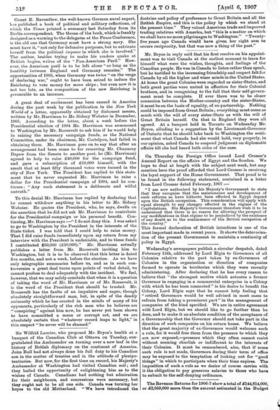To this denial Mr. Harriman has replied by declaring that
Ile cannot withdraw anything in his letter to Mr. Sidney Webster. He quotes the President, who, he says, dwells on the assertion that he did not ask Mr. Harriman to contribute for the Presidential campaign or his personal benefit. Con- tinuing, Mr. Harriman says :—" I do not deny this. I was asked to go to Washington by the President in the interests of the State ticket. I was told that I could help to raise money. That I did raise funds immediately upon my return from my interview with the President is undeniable, and to these funds I contributed $50,000 (£10,000)." Mr. Harriman actually publishes a letter from Mr. Roosevelt inviting him to Washington, but it is to be observed that this letter is dated five months, and not a week, before the election. As we have only telegraphic summaries before us, and as in such con- troversies a great deal turns upon points of verbal detail, we cannot profess to deal adequately with the incident. We feel, however, that we may safely conclude that when it is a question of taking the word of Mr. Harriman or of Mr. Roosevelt, it is the word of the President that should be trusted. Mr. Roosevelt has the faults of an impulsive and eager, though absolutely straightforward man, but, in spite of the deadly animosity which he has created in the minds of many of his opponents, particularly of the rich men who he believes are " conspiring " against him now, he has never yet been shown to have committed a mean or corrupt act, and we are absolutely certain that "whatever record leaps to light," in this respect "he never will be shamed."










































 Previous page
Previous page